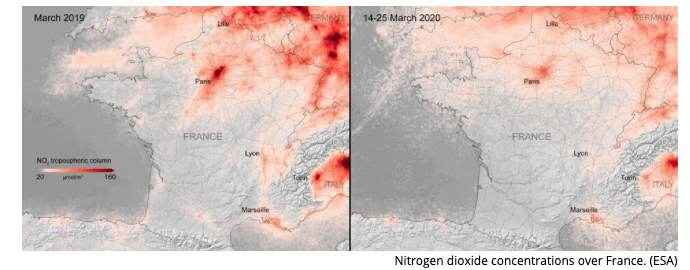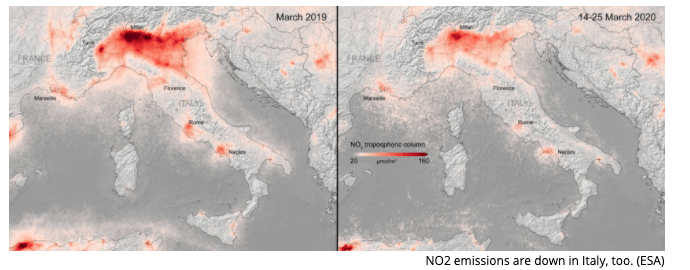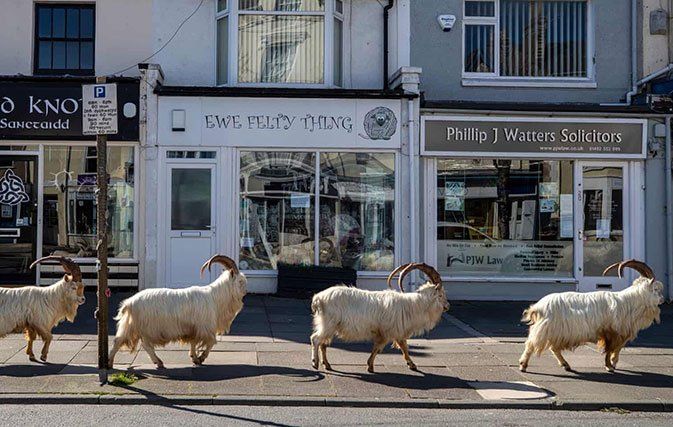The Sliver Lining; Nature Bounces Back due to Coronavirus Lockdown!
In recent weeks, we have got a glimpse into how resilient mother nature can be, as she bounces back with such a great reduction in carbon emissions and human activity. First the environmental changes were visible from space, then, as the disease and the lockdown spread, they could be seen in the sky above our heads, the air in our lungs and in our local harbours.
A trio of killer whales swims under the Ironworkers bridge April 16th 2019 (Twitter/VPD Marine Unit)
As the novel coronavirus spells catastrophe for human society, for nature it is a reprieve. While the tally of sick people mounted horrendously from a single case in Wuhan, China to a global pandemic that has so far killed more than 140,000 people, nature, it seems is slowly recovering. As the world implemented a lockdown, motorways cleared and factories closed, and dirty brown pollution belts shrunk over cities and industrial centres in country after country within a matter of days. First China, then Italy, now the UK and Ireland, Germany and dozens of other countries have undergone temporary reductions in carbon (CO2) and nitrogen dioxide (NO2) pollution, up to as much as 40%, greatly improving air quality.
Similar to what happened in China during lockdown, Europe is now seeing the same drop in air pollution. This data comes from the European Space Agency (ESA), and their Copernicus Sentinel-5P satellite which shows nitrogen dioxide (NO2) emissions over France in March 2019 in one frame, and between March 14th to the 25th on the next frame. Dense red indicates higher emissions of NO2.
Scientists from the Royal Netherlands Meteorological Institute (KNMI) are using the satellite to monitor both weather and pollution over Europe. It's not only Paris that shows a large drop, it's also cities like Milan and Madrid. It's not just NO2 emissions that are down either. So are green house gases. In fact, almost anything to do with human activity is down, besides internet traffic.
We all heard about Venice's clear blue waterways, in the absence of tourist footfall, motorised boats and gondolas. Maybe you have also heard that deer were spotted roaming around Italy or that a small seaside town in Wales has been taken over by wild goats. Generally, the Kashmiri mountain goats are forced to limit their social interactions on a nearby limestone bluff, but were recently spotted roaming around the town of Llandudno, whose residents have been forced to remain indoors during Britain’s national lockdown.
Photo Credit: Twitter @ItRecks
With the streets empty, the curious wild goats were caught on camera congregating in church parking lots, nibbling on hedges, strutting across stone walls, crossing pedestrian walkways, and just generally having a grand ol’ time.
Obviously these goats are living their best quarantined life!
Just kidding around, yeah? 🐐 pic.twitter.com/NHpV3seMlA
— Andrew Stuart (@AndrewStuart) March 28, 2020
In the town near me (Llandudno) the mountain goats have moved further down out of hills and have started wandering around the town more to graze !! pic.twitter.com/m4dlp9Tydn
— 𝔰𝔞𝔯𝔞𝔥 (@VampireGhuleh) March 30, 2020
However, it isn't just Europe that is experiencing the environmental benefits of human lockdown, as China's air pollution also plummeted and in Canada, for the first time in more than five decades, killer whales have been swimming freely up river in Vancouver.
Now we can include incredible whale sightings off the coast of Vancouver as yet another unexpected side effect of the ongoing pandemic and lockdown measures. With most Vancouverites staying indoors, the whales have been seen happily swimming about, " the first time in 59 years they have been spotted so far up Indian Arm " - says North Vancouver councillor Jim Hanson.
Apparently the natural world likes the economic slow down. Saw a pod of four Orca whales in Indian Arm yesterday. First time in my 59 years I have seen whales this far up the Arm. #northvan pic.twitter.com/WYoi6RrJcT
— Jim Hanson (@jimhanson_NV) March 28, 2020
The killer whales were also seen exploring Vancouver’s float plane terminal, which on a normal day would be full of loud seaplanes, and again in downtown Vancouver, swimming in the central harbour, usually filled with boat traffic.
Shared by a friend: Whale spotted by the float plane terminal yesterday (usually it’s so busy with human activity , you would not see this) #MotherNature #Vancouver pic.twitter.com/foVWFVOabr
— Mary Pynenburg (@Womanwhovotes) March 29, 2020
Wow. 2 killer whales 🐳 swimming in Vancouver Harbour, right in front of where we live in Coal Harbour.
— Spencer Chen (@spencerchen) March 28, 2020
With Vancouver on lockdown, the harbour has become a much quieter & friendlier place for nature. pic.twitter.com/fMJBPSOQ91
However, the transient killer whales had been spotted in Vancouver harbour last year also around the same time of year and are expected to return again. Two separate groups of Bigg's Killer whales were spotted swimming into the harbour to snack on seals. Unlike the resident killer whales who feed on chinook salmon, Bigg's killer whales feed on marine mammals. A group of five individuals from the T049A pod, a mother and her four sons, were seen on Tuesday the 23rd of April 2019. Similar to the most recent sighting, the whales swam through the harbour under the Second Narrows Bridge and up into Indian Arm.
" It's been many years since we've seen that happen
," said Lance Barrett-Lennard, director of the Marine Mammal Research program at Ocean Wise.
" I was quite pleased to see that they actually ventured up into Indian Arm, a place that they would have used quite frequently a hundred years ago.
"- he added.
Seeing the whales this far in the harbour is a rare occurrence. Seals are popular prey for Bigg's killer whales and there are plenty of them in the harbour. As long as the seals stick around and the harbour isn't too crowded with boats, Barrett-Lennard says it's likely the whales will continue to return. And return they did in 2020, however this year they were seen even further into Indian Arm and in places such as the seaplane float terminal that without the lockdown measures they likely wouldn't have ventured.
Concerns arise when we consider that China's air pollution has already increased back to normal levels having lifted lockdown measures and we wonder how long will nature sow the benefits of our absence? Will we return to our old ways normal, where roads leading into the world's cities are grid-locked with vehicles every morning and every evening? Will we return to the gross cumulative hours of wasted human productivity, as people spend hours commuting to work each day? Or will we learn a lesson from this pandemic?
According to experts, this drop in harmful emissions may be a glimpse of a possible future, but not one that's likely to endure unless we have a major overhaul of daily human behaviour. Without big changes to our out-put of emissions, beyond the time-frame of this pandemic, we'll be right back to where we were a month or two ago: overwhelming the Earth's carbon cycle and polluting the air with NO2. Not to mention introducing noise and plastic pollution to our marine habitats.
© Ocean Research & Conservation Ireland (ORCireland) and www.orcireland.ie , est. 2017. If you like our blogs on the latest news in marine science and would like to support our work, visit www.orcireland.ie to become a member, to volunteer or to make a donation today.
SHARE THIS ARTICLE

















